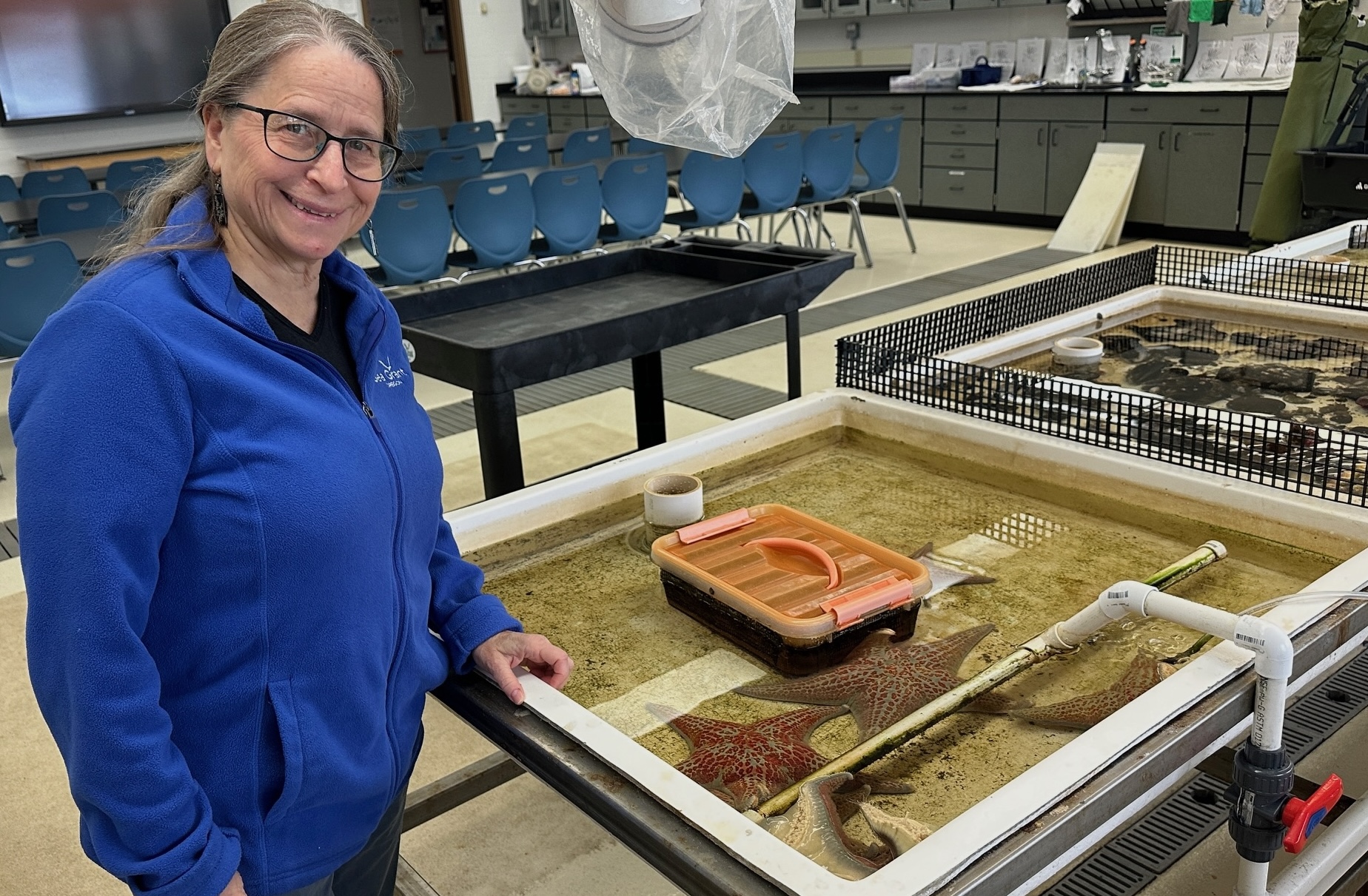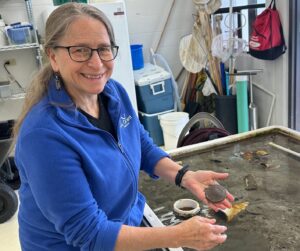
By KATHLEEN O’CONNOR/YachatsNews
How many of us have been lucky enough to be hired for the perfect job? The job that will use and require all the knowledge we’ve gained from all our previous jobs and provide us with continuous opportunities to contribute effectively and to grow personally?
Kama Almasi started her perfect job in April as director of the Oregon Coast STEM (science, technology, engineering, and math) Hub.
 The Hub is one of 13 in Oregon established by the 2014 Legislature. Its goal is to help provide science and technology education to students on the coast, from Astoria to Brookings. The Hub works with more than 60 partners to provide STEM learning opportunities for students from pre-kindergarten through college.
The Hub is one of 13 in Oregon established by the 2014 Legislature. Its goal is to help provide science and technology education to students on the coast, from Astoria to Brookings. The Hub works with more than 60 partners to provide STEM learning opportunities for students from pre-kindergarten through college.
Almasi’s journey to her perfect job has taken her many places. She grew up in Seattle, where her mother still lives. After high school she moved to the east coast to attend Connecticut College. She spent her junior year in Japan, and after college she went back to Japan for another year, becoming fluent in Japanese.
She returned to pursue a career in marine biology. Her doctorate in ecology took six years, one of which was a “gap year” spent in Yachats, baking pies and quiches at the old Orca Natural Grocers store.
After graduation she worked for the U.S. Environmental Protection Agency, was a biology professor at the University of Wisconsin-Stevens Point, taught science in the Lincoln County School District for 14 years, spent two years in Washington D.C., and returned to work as an Oregon STEM education specialist.
Almasi has deep roots here. Her family vacationed at the Edgewater Cottages south of Waldport throughout her childhood, and eventually built a cabin in Yachats. Husband Rex Smith’s family owned a home at the junction of U.S. Highway 101 and Tenmile Creek Road. They built a home on that property in 2008.
Question: How did you become interested in being a marine biologist?
Answer: I had an exceptionally good marine biology teacher in high school, Craig MacGowan. My high school was racially diverse and had students from families in every income level. Mr. MacGowan arranged outstanding field trips for all of us throughout Washington, and he was intent on getting every single one of us to understand the concepts he was teaching. And he was very successful. Three of the scientists I work with in Oregon are former students of Mr. MacGowan.
Q: You went from teaching at a university to teaching in high school. What prompted that decision?
A: When we lived in Stevens Point I started volunteering at my son’s school, helping in the science classes in multiple grade levels. I enjoyed it thoroughly, and soon found I was eagerly looking forward to my volunteer days. The school was just a short walk from my office on campus, and, conversely, I found my energy draining as I walked back to work.
I finally decided to pay attention to this fact, and one of the primary reasons I decided to leave the university was to shift my career path to teaching high school. The other reason I left was that I had come to realize that “place” had become more and more important to me as I evaluated work opportunities. Rex and I and our son, Koa, were all anxious to make Yachats our home.

Q: How is the Oregon STEM Hub working to improve equity and inclusion in its programs?
A: Every program we offer with the support of our partners is evaluated before and after it is implemented to try to assure that we reach all learners. We are constantly asking who we might be missing. Our goal is to collectively organize our partners to reach all our students, especially those who have been historically underserved.
In the past, Oregon has not scored well in science education. In our state, as well as others, science often takes a back seat to reading and math. We are working to provide project-based STEM learning opportunities at every grade level.
Q: You spent two years in Washington D.C. as an Albert Einstein Distinguished Educator Fellow. What was that like?
A: The purpose of the program is to allow STEM educators to serve in the national education arena. The first year I was sponsored by the U.S. Geological Survey. The second year I was sponsored by Congress, and worked with Jamaal Bowman, a congressman from New York. Each fellow was assigned projects by his/her federal agency, but each of us also chose to study issues geared to our passions and interests. For me that was equity and inclusion in science education.
The first year of the fellowship started in August 2020 during the pandemic. That made everything a little crazy, but it was still a remarkable experience to be part of federal government and to work with so many exceptional STEM teachers from around the country.
Q: What do you like to do when you’re not working?
A: I am an avid geocacher. I think there’s only two geocaches I haven’t found in Yachats, one on Cape Perpetua and one near Thor’s Well, and I’ve placed about 15 geocaches over the years.
Also, during covid one of my colleagues introduced me to the Great British Baking Show. I’ve always liked to bake, and that show pushed me to improve my baking and to try more things. I am so hooked on watching it that I now have a VPN so that I can watch the competitions in other countries. My favorite is the Canadian show.
Rex and I like to go camping, and we’re birders, too.
Tell us a secret.
My father was an orphan; he was just an infant when his mother died. He was raised in the St. Mary’s Home for Boys in Tigard. Although I asked many times, he did not want to talk about growing up there. We learned not too long ago that his mother died in the Oregon State Mental Hospital.
Contact information: Kama.almasi@oregonstate.edu; Facebook: Oregon Coast STEM Hub; Website: oregoncoaststem.oregonstate.edu
- Kathleen O’Connor is a Waldport freelance writer who can be reached via email at kmoc8916@gmail.com


